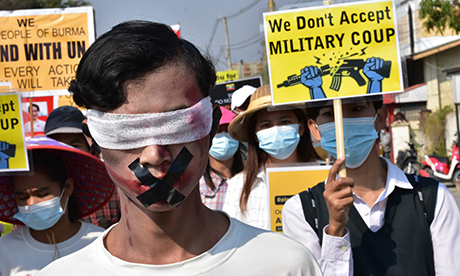Despite the risk, three bishops from Myanmar have spoken cautiously and emotionally about the military coup in their Southeast Asian nation.
Accustomed to discretion, all three know that a word against the army would endanger them and their Catholic people.
Archbishop Marco Tin Win, Bishop Noel Saw Naw Aye and Bishop Lucas Dau Ze Jeimphaung were speaking in Paris on their way to Lourdes and the Vatican.
Since the military coup of February 1, 2021, a large civil disobedience movement has been pushing for a return to democracy.
“The resistance to the coup has been commensurate with the hopes of the people, who voted overwhelmingly in November 2020 for the party that they believed would bring them freedom,” emphasised Archbishop Marco Tin Win, 62, of Mandalay.
The 2020 parliamentary elections were won by the National League for Democracy (NLD), led by Aung San Suu Kyi.
The win put the NLD in a position to challenge the military junta’s many privileges guaranteed in the 2008 Constitution.
However, the army staged a coup to preserve its power and took control of the country. Since then, the military has used force to control the population, including firing on protesting civilians.
In July, the junta executed four political prisoners, sending a clear message to its opponents.
“Although everyone is now a victim of the military, the younger generation is particularly targeted,” said Noel Saw Naw Aye, 53. He is an auxiliary bishop and right-hand man of Cardinal Charles Bo in Yangon, the country’s economic capital.
“The army is afraid of their talents, especially their mastery of new technologies and of their zeal,” added Bishop Tin Win.
While in the past, the junta fought in particular against Christian ethnic minorities on the border territories, “fires and murders are now taking place everywhere, including in the big cities like Yangon,” said Bishop Saw Naw Aye.
“Most victims of military cruelty are Buddhists. But Christians, who have been persecuted with general indifference in remote areas in the past, are now included,” he added.
On April 8, a few days before Holy Week, the army invaded the Mandalay Cathedral to search the premises.
“They were looking for evidence that we were passing on information about the bombings and killings in Christian villages,” explained Bishop Tin Win.
The Christian community, particularly religious, is very involved in helping the civilian population.
“The nuns, with the help of volunteers, are organising clandestine clinics because the hospitals are empty,” explained the archbishop of Mandalay.
“Medical personnel have joined the civil protest movement en masse and are being persecuted and arrested by the army. The villagers who flee when the army arrives only have us. Church compounds are becoming refugee centres,” he said.
“Children are the first victims of this civil war,” pointed out Bishop Lucas Dau Ze Jeimphaung of Lashio – the largest city in the northern part of Shan State in the east.
“They have not been to school for three years. We have organised informal classes so that everyone has a chance to study!” said Bishop Jeimphaung.
The three bishops will continue to speak out; they are convinced that “in this darkness, God can bring light!”
Sources
Additional reading
News category: World.




